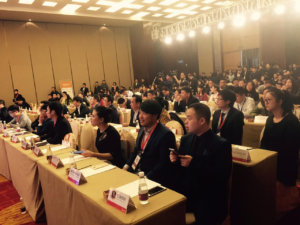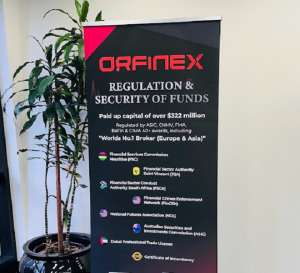No more bogus exchanges or counterfeit platforms. It’s professional FX liquidity and prime of prime these days
For today’s Chinese brokerage, quality IB relationships and connectivity via a bona fide prime of prime are vital. Here in Shanghai, we look at how China’s FX industry is completely B2B. Fake exchanges and warehouse brokerages cannot measure up to China’s sophistication, and Western firms wishing to join in must not do so remotely

Mainland China is something of its very own economic, industrial and financial ecosystem.
Between the non-Chinese world and China’s 1.4 billion highly educated population, many of whom are either employed by, or leaders of, all encompassing companies in all sectors which provide the entire world with everything from household goods to technology, is the world’s most sophisticated internet firewall.
A firewall that employs over 2 million government officials and filters absolutely every piece of data, every transaction and every commercial and private activity with the free market world has been the top consideration for many small to medium FX brokers over the last few years.
Simply receiving money from clients via various algorithmic payment channels, or forging remote relationships with introducing brokers has been a model employed for quite some time now, which is an absolute display of lack of ability to navigate the business environment in China.
Until relatively recently, there were two FX industry dynamics that were pertinent to China.
Among smaller Western brokerages the first dynamic could be found. This being the hunger among smaller brokers to make telephone calls to Chinese customers and then turn them into an introducing broker by encouraging them to introduce their network.
Among Chinese brokerages, the second dynamic could be found, in which you-against-me systems were employed and no live market connectivity existed.
These are both well and truly obsolete in today’s world.
Here at the annual FX industry conference hosted by YOCA in conjunction with FinanceFeeds, the results of research conducted by FinanceFeeds with regard to navigating business in China have been further compounded by extensive viewpoints and perspectives from those with vast experience.

Pavel Khizhnyak, Founder and CEO of Trade Exact, which is a consultancy and professional services company that extends service to brokerages, liquidity providers, technology vendors and infrastructure companies within mainland China, as well as firms looking to enter mainland China, spoke at length with FinanceFeeds on this matter.
Having asked Mr. Khizhnyak, who speaks Chinese fluently, why firms that do not commit resources to working within China itself and approach the market remotely are unable to make a longstanding establishment in China and what is the most important aspect relating to being able to garner a Chinese client base correctly, he said “I think the answer to your question lies within your question. You said we are here, and that’s the key.”
“The problem is that the most of the brokers trying to conquer the Chinese market don’t always realize that making decisions from thousands of miles away is not the way to to it” he continued.
This concurs with FinanceFeeds research in that in order to have a sustainable business here in China, firms must have complete Chinese infrastructure, and must be focused on one region only – the mainland.
Testing the patience of Chinese IBs is not the way to go
Whilst Chinese business ethic is of a very high quality, and those who actually make the effort to continually meet their introducing brokers are often treated with extreme and unfaltering respect, it is clear that in today’s highly competitive market, there is no time for tardiness.
A commonly held misconception among small to medium sized brokerages in Free Market countries is that Chinese IBs need them, when the actual reality is quite the opposite.
So vast, and so well organized are today’s Chinese IBs that, as with many other industry sectors, the rest of the world needs China, not the other way round.
For this reason, patience is wearing thin.
Mr. Khizhnyak explained to FinanceFeeds today here in Shanghai “The patience of many Chinese IBs is very thin and competition is very tough. You have a very short time to get the decision before they go elsewhere”.
“This happens so quickly that by the time the CEO of the brokerage whose sales team struck a deal with an IB in China wakes up, the client has already opened an IB account elsewhere and several trading accounts are up and running” – Pavel Khizhnyak, CEO & Founder, Trade Exact.
Another aspect is the Chinese respect for correct and proper business conduct, hence the understanding of regulation in different regions is very comprehensive among Chinese participants, according to Mr. Khizhnyak.
“Chinese clients are much more aware of regulation than people in other regions, for example in Russia, and are very perfectionistic” he said.
“Today’s Chinese electronic trading ecosystem is a completely business to business world. It is a market driven by API clients, IBs, money managers and large brokerages. Nowadays, we have seen the transitioning of Chinese brokers from complete B book operations toward the standard model of brokerage connected to multiple liquidity sources, that can accept different types of clients and can STP the order flow” – Pavel Khizhnyak, CEO & Founder, Trade Exact
….and they are not always using Chinese LPs either.
“Think of it this way” enthused Mr. Khizhnyak. “I recently discovered that there are more than 1000 municipal exchanges in China, sometimes several in one city. The word ‘exchange’ is used, however these are effectively similar to small warehouse brokerages because they do not have any extenral liquidity and trade agaisnt their clients.”
“This is absolutely contrary to the US where you have around 4 major exchanges and everything is transparent, hence the demand for proper execution and the Chinese IBs and brokerages’ unrelenting quest to find it and work properly with it is very much a major component of the business” he said.
Enthusiastically, Mr. Khizhnyak, echoing a tremendous amount of enthusiasm for a high quality and exponentially growing FX industry in China, explained “The market is growing, and there is a massive demand for professional liquidity and for brokers that are committed to moving the market on.”
“I delivered a speech recently about the Chinese firewall. In China it is harder to achive fast execution because of the latency invoked by the firewall if the feeds are coming in from outside. You have to have dedicated servers in China so they dont have to check any external data” he said.
In summary, Mr. Khizhnyak’s view is “If you do China you do just China” meaning concentration on the mainland is paramount, and specifying infrastructure that is hosted and operated from within the mainland is vital. Going into various regions of South East Asia, some of which are being vaunted as growth areas, is not the same as going into China.
He is indeed absolutely right.
Not only is China a veritable powerhouse and has an astute, comprehensively educated base of traders, IBs and brokers, who have textbook understanding of the full functionality of the FX industry, but specific tools are needed to succeed and reap the benefits of working in such a vast and top-drawer environment, those being, among others Chinese connectivity with Chinese hosting and infrastructure companies, Chinese servers which are located inside the firewall or in Hong Kong, and complete accessibility to vital FX industry networks which are heavily reliant on WeChat and Baidu.
This cannot be achieved remotely, and, with the Western firms here in China displaying their prowess by having fully functioning and comprehensive offices in the country, it is clear to see which have got the largest client bases and the greatest tailored presence in China.
With regard to bringing a brokerage into China, Mr. Khizhnyak said “There is basically human commitment where you need to move key devision makers to China, station all technology development in China and maintain a commitment to create IT infrastructure here locally to ensure good connectivity and to customize the products in terms of pricing and IB policy as it is a much more demanding market in terms of IB strucutre than anywhere else ive ever been in my 12 years in the industry.”
Chinese brokerage balance sheet?… What on earth does that say?
One of the major concerns recently among many brokerages and prime brokerages is the curtailing of credit by Tier 1 banks, and if the Chinese FD industry begins to put massive demand on Tier 1 liquidity, banks are likely to become even more sparing with their extension of credit as they are unable to assess the balance sheets of brokerages in China which are on one side of the firewall whilst the bank is on the other.
Surely, no bank will ask for a Chinese language balance sheet from a brokerage wanting a prime brokerage agreement, as it will be illegible to a non-Chinese risk manager, and cannot be verified as the data is not reportable and any searches into company data from the outside is heavily censored by the government on the inside.
Mr. Khizhnyak explained that most of the firms in China work via prime of prime brokerages. On this basis, it is much easier for banks as they transfer the responsibility of ensuring a large and acceptable capital base is displayable to a Tier 1 liquidity provider to the prime of prime.
This means that if a prime of prime wishes to extend liquidity to a Chinese partner, it would have to demonstrate to the bank that if something goes awry, it can be covered by the prime of prime brokerage’s capital, and the bank would have to be satisfied that the prime of prime has assessed something that is very difficult to assess. Not an easy matter in today’s ultra-conservative counterparty credit environment.
This perspective has led to an extremely high level of awareness among Chinese brokers as to which liquidity provider to use.
Earlier today, FinanceFeeds met with Apple Xie of Fortex’s Shanghai operations, and a Chinese brokerage that is a customer of the firm, taking a liquidity feed.
The CEO of the Chinese brokerage explained “We use Advanced Markets & Fortex for liquidity because of Macquarie Bank is one of their shareholders, and they have a very long relationship with many Tier 1 banks. This is very important to us”, highlighting the extent of knowledge and depth of relationships between prime of prime and Chinese brokerage in today’s environment.
Once again, it is a case of being China-centric, and having full operations in China, and that applies to the entire ecosystem right the way from server hosting, to marketing, and from prime of prime to platform integration provider.









